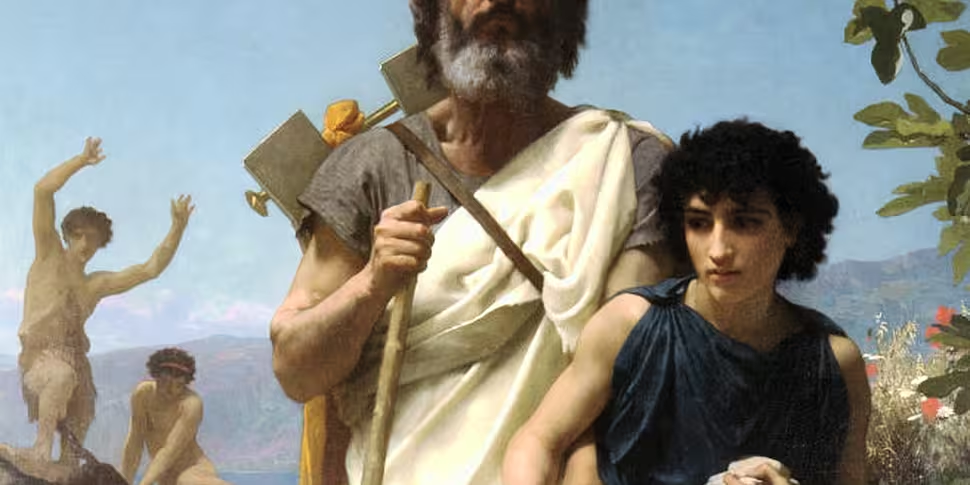Tell me, O Muse, of the man of many devices, who wandered full many ways after he had sacked the sacred citadel of Troy. – Opening line of ‘The Odyssey’
An oft quoted maxim about writing is that there are only two stories; a man goes on a journey or a stranger comes to town. Sometimes tacked onto the end of this is that they were both written by the ancient Greek scholar Homer.
Though his works are usually dated to the 7th or 8th century BC little is actually known about the life of this giant of literature. There is in fact considerable debate over the existence of any single figure known as Homer, with many scholars arguing that ‘Homer’ instead refers to an amalgamation of authors from the classical period. What is known is that the stories attributed to Homer are amongst the most important and influential writings in history and form the cornerstone of Western literature.
Today the figure of Homer continues to loom large across the collective psyche of the Western World. While the echoes of ‘The Iliad’ and ‘The Odyssey’ still resonate through all mediums of art Homeric studies continue to be one of the largest of all literary sub-disciplines. What is it about Homer’s works that so capture our imaginations? And why do we continue to be enamoured by this ancient poet and his epic works so many centuries later?
 Fresco of Achilles' triumph in Corfu Achilleion
Fresco of Achilles' triumph in Corfu Achilleion
One of the most distinguishing features of the Homeric works is the focus on the individual characters and the dramatic events of their lives. While ‘The Iliad’ does tell the wider story of the siege of Troy and the city’s infamous downfall these great events are secondary to the main tale of individual heroism and loss. Remembered mainly for the tragic figure of Achilles ‘The Iliad’ is centre around his falling out with the leader of the Greek host, Agamemnon, and the sorrow that follows.
After having his concubine, Briseis, taken by Agamemnon as compensation for the sacrifice of his own captive Achilles withdraws his forces from the fighting and beseeches the gods to bring ruin on the Greek forces. The gods oblige and the Greeks are pushed back after days of fierce fighting and a great loss of life. As the fighting moves amongst the Greek ships Achilles gives his leave to his closest friend, Patroclus, to join the fray, clothing him in his own arms and armour.
The central moment of the story comes when Patroclus pushes the Trojans back to their own walls only to be killed by the prince of Troy, Hector. Achilles leads the Greek attack the next day and butchers many Trojans in the resulting rage, including Hector. After desecrating Hector’s body for several days Achilles’ rage finally abates and turns to sorrow as he is confronted by Hector’s grieving father. This scene of the old king and the young warrior grieving together is made all the more poignant by Achilles’ fated death.
 Priam supplicating at the feet of Achilles
Priam supplicating at the feet of Achilles
The use of fate is central to Homer’s works and he uses it to drive his stories forward and infuse them with tragedy. Unlike later authors like Shakespeare, however, Homer’s use of fate isn’t a simple plot device. Achilles and Hector become the embodiment of the tragic hero because of their willing acceptance of death. Their fates are clearly shown to both men and they are given the choice: an anonymous life or a glorious death. Both men embrace death; becoming immortal heroes and literary archetypes that can still be seen today.
In ‘The Odyssey’, Homer’s second major work, fate rears its head once again. During the siege of Troy many Greeks committed wrongs against the gods. In retribution they are doomed to death or long and hard journeys home. Odysseus falls into the latter category and must struggle through the Mediterranean for ten years before he can safely return home. Along the way every ship and man besides Odysseus himself are lost to the perils of the world.
While his crew carries a great deal of the blame for their demise, it was Odysseus who first incurred the wrath of Poseidon and damned the journey home. Homer’s tale of this tragic voyage and triumphal homecoming has become one of the most iconic and influential of all time. Despite his faults and the doom he brings upon his crew Odysseus is painted as a great captain and leader of men. In many ways Odysseus and Achilles act as contrasts to one and other. While Achilles’ passion and sorrowful fate have immortalised him as the great warrior Odysseus calm head and perseverance have cemented his status as the great captain and adventurer.
 'Ulysses and the Sirens' by Herbert James Draper circa 1909
'Ulysses and the Sirens' by Herbert James Draper circa 1909
While the translations of these epic poems have ensured that Homer’s name and the stories he told are still alive and strong these works have also fuelled the academic world. With the texts predating the ‘father of history’, Herodotus, the Homeric texts offer an insight into an all but unknown world. While some people search for grains of truth between the tales of gods and monsters others look to the figure of Homer to see what he tells us about the history of writing and storytelling. If there ever was a man named Homer was he the fabled blind poet who conjured up tales of Helen’s beauty and the woe it brought onto the world, or was he the author who immortalised these ancient oral stories in the written word?
Listen back as 'Talking History' travels back to ancient Greece and looks at the life and poetry of Homer. Despite being separated by millennia of history the Homeric works still resonate with people to this day and authors continue to look to the ‘The Iliad’ and ‘The Odyssey’ for inspiration. Join us as we hear all about the life and legacy of Homer. What do we actually know about this founding figure of western literature? Were the Homeric texts composed by one person or are they the accumulation of generations of oral story telling? What has been the lasting impact of these tales? And why do the figures of Achilles, Hector, and Odysseus still loom so large in the Western psyche?









